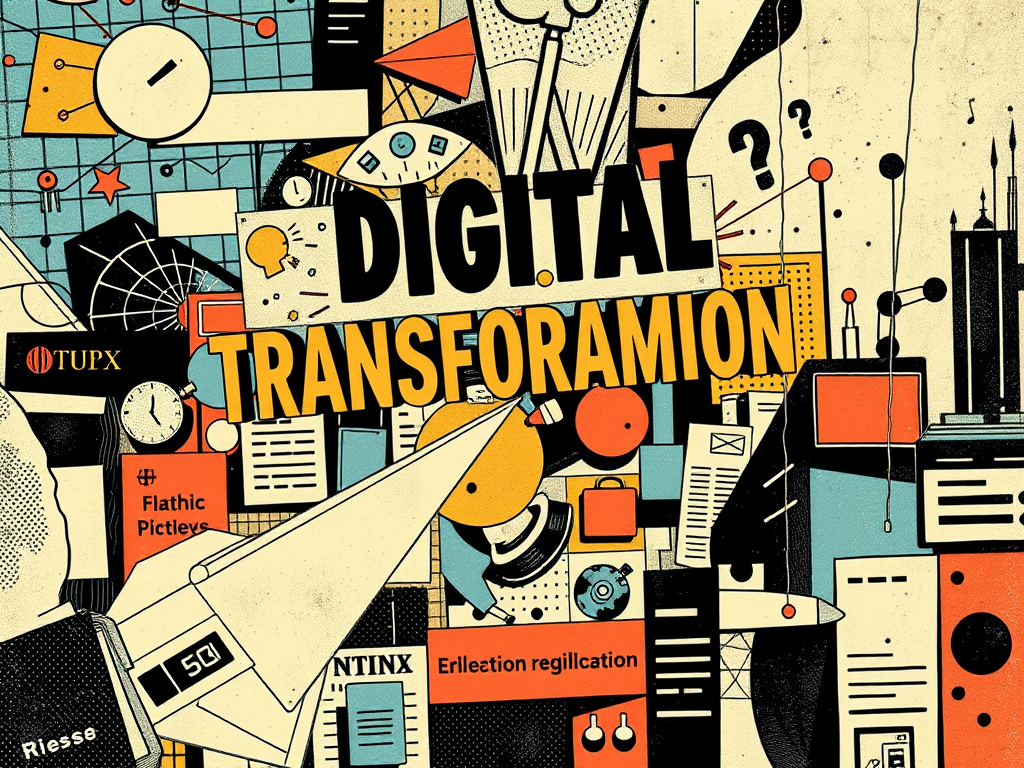
Technology and Digital Governance: Greece’s Digital Transformation and Business Climate
Reading time: 15 minutes
Table of Contents
- Introduction
- Greece’s Digital Transformation Journey
- The Impact on Business Climate
- Key Sectors Driving Digital Growth
- Challenges and Opportunities
- Future Outlook
- Conclusion
- FAQs
1. Introduction
In recent years, Greece has embarked on an ambitious journey of digital transformation, aiming to modernize its economy, improve public services, and enhance its overall business climate. This comprehensive analysis delves into the intricacies of Greece’s technological evolution, examining its impact on various sectors and exploring the challenges and opportunities that lie ahead.
As we navigate through this complex landscape, it’s crucial to understand that economic trends in technology and digital governance are never linear – they form a dynamic, interconnected ecosystem that requires multi-dimensional analysis. The interplay between government initiatives, private sector innovation, and global technological advancements creates a fascinating economic environment that deserves careful scrutiny.
2. Greece’s Digital Transformation Journey
Greece’s digital transformation journey began in earnest following the economic crisis of the late 2000s. Recognizing the need for modernization and efficiency, the Greek government has since implemented a series of reforms and initiatives aimed at digitalizing public services, improving connectivity, and fostering innovation.
2.1 Key Government Initiatives
The Greek government has launched several key initiatives to drive digital transformation:
- Digital Governance Bible: A comprehensive strategy outlining the country’s digital transformation goals and implementation plans.
- Gov.gr: A centralized portal for accessing public services online, significantly reducing bureaucracy and improving efficiency.
- 5G Greece: An ambitious plan to roll out 5G networks across the country, enhancing connectivity and enabling new technologies.
- Digital Skills for All: A program aimed at improving digital literacy among Greek citizens and businesses.
2.2 Infrastructure Investments
Alongside these initiatives, Greece has made significant investments in digital infrastructure:
- Fiber optic network expansion, increasing high-speed internet coverage across the country.
- Data center developments, attracting major tech companies to establish operations in Greece.
- Smart city projects in major urban centers, improving efficiency and quality of life for residents.
3. The Impact on Business Climate
Greece’s digital transformation has had a profound impact on its business climate, creating new opportunities and challenges for both domestic and international companies.
3.1 Improved Ease of Doing Business
The digitalization of public services has significantly reduced bureaucracy and streamlined processes for businesses:
- Online company registration and tax filing systems have reduced processing times and costs.
- Digital signatures and e-documents are now widely accepted, facilitating faster transactions.
- Online platforms for public procurement have increased transparency and competition.
3.2 Attracting Foreign Investment
Greece’s digital transformation has made the country more attractive to foreign investors:
- Improved digital infrastructure has made Greece a viable location for tech companies and startups.
- The government’s commitment to digital innovation has increased investor confidence.
- Digital nomad visa programs have attracted international talent and remote workers.
4. Key Sectors Driving Digital Growth
Several key sectors are at the forefront of Greece’s digital growth, driving innovation and economic development:
4.1 Fintech
The financial technology sector in Greece has seen significant growth, with innovations in:
- Mobile banking and digital payment solutions
- Blockchain and cryptocurrency technologies
- Insurtech and regtech applications
4.2 E-commerce and Retail
The e-commerce sector has experienced rapid expansion, particularly accelerated by the COVID-19 pandemic:
- Growth of online marketplaces and digital storefronts
- Adoption of omnichannel retail strategies
- Development of last-mile delivery solutions
4.3 Tourism and Hospitality
Greece’s crucial tourism sector has embraced digital transformation:
- Online booking platforms and virtual tours
- Smart hotel technologies and personalized guest experiences
- Digital marketing and social media strategies
5. Challenges and Opportunities
While Greece’s digital transformation journey has been impressive, it is not without its challenges. However, these challenges also present significant opportunities for growth and innovation.
5.1 Challenges
- Digital skills gap: Despite efforts to improve digital literacy, there remains a shortage of skilled tech professionals.
- Regional disparities: Rural areas lag behind urban centers in terms of digital infrastructure and adoption.
- Cybersecurity concerns: As digitalization increases, so do the risks of cyber threats and data breaches.
- Regulatory adaptation: Legislation and regulations need to keep pace with rapid technological advancements.
5.2 Opportunities
- Startup ecosystem development: The growing tech scene presents opportunities for entrepreneurs and investors.
- Green tech integration: Combining digital transformation with sustainability initiatives can drive eco-friendly innovation.
- Public-private partnerships: Collaboration between government and private sector can accelerate digital adoption and innovation.
- Export of digital services: Greece has the potential to become a regional hub for digital services and expertise.
6. Future Outlook
Looking ahead, Greece’s digital transformation journey shows promising signs of continued growth and development:
6.1 Emerging Technologies
Greece is poised to capitalize on emerging technologies:
- Artificial Intelligence and Machine Learning applications in various sectors
- Internet of Things (IoT) solutions for smart cities and industries
- Extended Reality (XR) technologies for tourism, education, and healthcare
6.2 Digital Governance Evolution
The government’s commitment to digital transformation is expected to continue:
- Further digitalization of public services and citizen engagement platforms
- Implementation of data-driven policymaking and predictive governance models
- Enhanced digital diplomacy and international cooperation in tech-related fields
6.3 Economic Impact
The ongoing digital transformation is likely to have significant economic impacts:
- Increased productivity and competitiveness across various sectors
- Creation of new job opportunities in tech-related fields
- Attraction of foreign direct investment in digital and tech industries
7. Conclusion
Greece’s journey towards digital transformation and improved digital governance represents a pivotal shift in the country’s economic landscape. The progress made thus far has already yielded tangible benefits in terms of improved business climate, increased foreign investment, and enhanced public services. However, the path ahead is not without challenges.
As Greece continues to navigate this digital revolution, it must address issues such as the digital skills gap, regional disparities, and cybersecurity concerns. Yet, these challenges also present opportunities for innovation, collaboration, and growth. The country’s commitment to embracing emerging technologies and fostering a robust digital ecosystem positions it well for future success.
The interconnection between digital transformation, economic growth, and governance creates a complex but fascinating environment. As we’ve seen in other economic sectors, such as the housing market where houses for sale in athens reflect broader economic trends, the digital landscape in Greece is similarly indicative of the country’s overall economic health and future potential.
In conclusion, Greece’s digital transformation journey is far from over, but the foundations laid and the momentum gained suggest a promising future. As the country continues to adapt, innovate, and grow in the digital realm, it has the potential to not only revitalize its own economy but also to become a significant player in the global digital landscape.
8. FAQs
Q1: How has Greece’s digital transformation impacted foreign investment?
A1: Greece’s digital transformation has significantly improved its attractiveness to foreign investors. The enhanced digital infrastructure, streamlined business processes, and government commitment to innovation have increased investor confidence. Additionally, initiatives like the digital nomad visa program have attracted international talent and remote workers, further boosting the country’s appeal to global businesses.
Q2: What are the main challenges facing Greece’s digital transformation efforts?
A2: The primary challenges include addressing the digital skills gap, reducing regional disparities in digital infrastructure and adoption, ensuring robust cybersecurity measures, and adapting regulations to keep pace with technological advancements. Overcoming these challenges is crucial for the sustained success of Greece’s digital transformation journey.
Q3: How is the Greek government promoting digital literacy among its citizens?
A3: The Greek government has implemented several initiatives to promote digital literacy, including the “Digital Skills for All” program. This comprehensive approach includes training programs, online courses, and partnerships with educational institutions and private sector companies to improve digital skills across all age groups and professions.
Q4: What opportunities does Greece’s digital transformation present for startups and entrepreneurs?
A4: Greece’s digital transformation has created a fertile ground for startups and entrepreneurs. Opportunities include developing innovative solutions in sectors like fintech, e-commerce, and tourism tech. The growing startup ecosystem, government support for innovation, and increasing availability of funding and resources make Greece an attractive destination for tech entrepreneurs.
Q5: How is Greece integrating sustainability with its digital transformation efforts?
A5: Greece is increasingly focusing on integrating sustainability with its digital transformation efforts. This includes developing green tech solutions, implementing smart city projects that improve energy efficiency and reduce environmental impact, and leveraging digital technologies to monitor and manage natural resources more effectively. The synergy between digital innovation and sustainability presents significant opportunities for eco-friendly economic growth.

Article reviewed by Jean Dupont, Institutional Investment Advisor | ESG & Impact Investing Pioneer | Aligning Profit with Purpose for Pension Funds, on March 25, 2025





